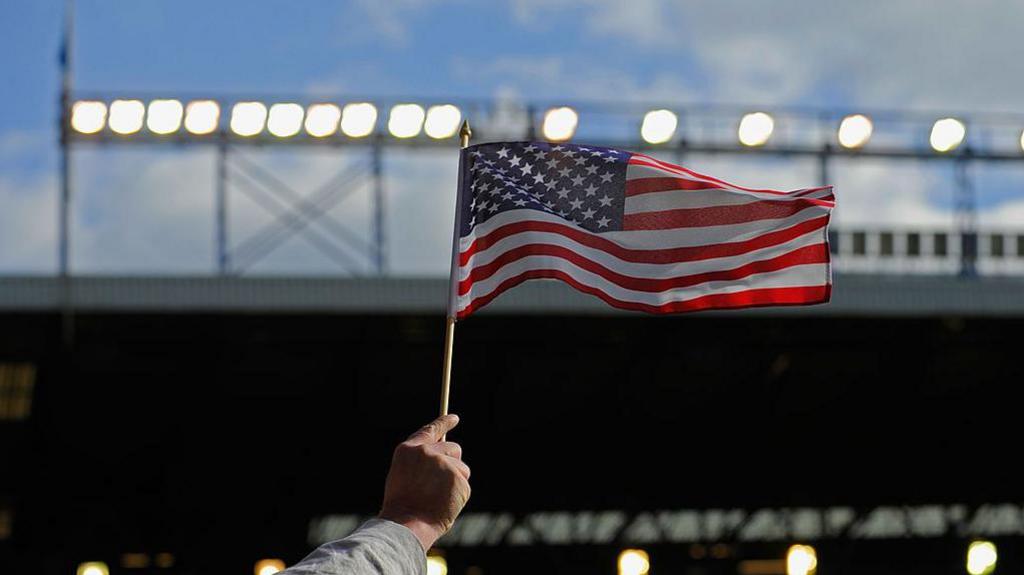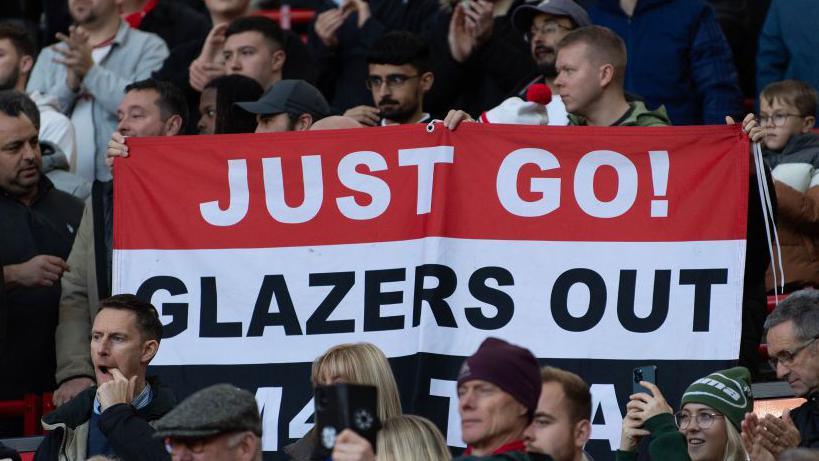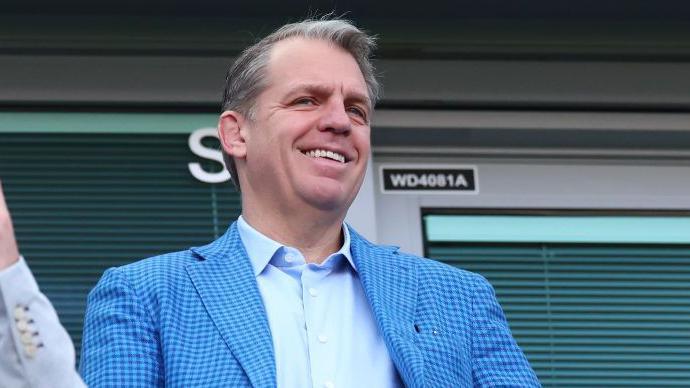How play-off final could tighten US grip on Premier League

The Texas-based Friedkin Group acquired Everton in December
- Published
Known as the richest match in football, the Championship play-off final has always been a game of huge significance, with promotion to the Premier League on the line.
But this year the stakes could be even higher.
If Sheffield United beat Sunderland on Saturday at Wembley, the level of influence wielded by American investors in the Premier League will reach an unprecedented level, with all three promoted clubs controlled from across the Atlantic.
Remarkably, the Blades would become the 12th US-owned club in the top flight, closer than ever to the two-thirds majority of 14 that is needed to impose changes to the Premier League's rules.
With a third of EFL clubs also partially or majority US-owned, and a number of English clubs for sale or seeking fresh investment, it may not be long until that tipping point is reached.
What forces are driving this trend? And what are the potential risks of a US-dominated Premier League?
Buying up the Premier League
In December Everton became the 10th Premier League club to fall under American control when they were bought by the Texas-based Friedkin Group, joining Liverpool, Arsenal, Aston Villa, Chelsea, Manchester United, Crystal Palace, Bournemouth, Ipswich Town and Fulham.
While Ipswich have since been relegated, the promotion of Leeds United (owned by the investment arm of the San Francisco 49ers) and Burnley (AIK Capital) ensured a majority of top-flight clubs next season will be US-owned, with Sheffield United (COH Sports) potentially to come.
That number could soon grow - especially with US-owned Wrexham and Birmingham City now promoted to next season's Championship, joining Norwich City, Millwall, Swansea and West Brom.
When did the trend start?
Twenty years ago the Tampa-based Glazer family bought Manchester United in a controversial, highly leveraged buyout, blazing a trail for other US investors.
However, the hundreds of millions of pounds of debt that was loaded on to United, the £1bn it has cost to service it, and the dramatic decline United have suffered since, both on and off the field, has done little for the reputation of those who followed in their footsteps.
The financial issues that defined the ownership of Liverpool by Americans George Gillett and Tom Hicks between 2007 and 2010 - when the club were at risk of going into administration - also added to the notoriety of US investors.

Manchester United fans have staged several protests against the Glazer family
What's the attraction for US investors?
To make money.
With most US investors in English football keeping a low profile and attending few matches, the motive seems to be financial rather than reputational.
While former American owners of Sunderland, Swansea and Aston Villa have lost significant amounts of money after getting involved in English football, others have been a lot more successful.
Although they are despised by many United fans, the Glazers have profited hugely from their ownership of the club, through dividends and the sale of shares that have grown in value, with Sir Jim Ratcliffe spending £1.25bn on a 28% stake last year.
Despite their worst season in decades, and hundreds of millions of pounds of financial losses, United were recently rated the second most valuable club in the world, external at $6bn (£4.4bn).
With closed leagues, there are few opportunities to invest in US pro sports, and when they arise it is very expensive, so the global game of football is an attractive option, especially with NBC's coverage of the Premier League, the Welcome to Wrexham documentary series and the Ted Lasso TV show fuelling interest.
Investors will also be banking on Lionel Messi's participation in the MLS and the USA's hosting of this year's Club World Cup and the 2026 World Cup to help grow the game.
US investors also believe that more revenue can be extracted from English football, whether through media rights, ticketing or sponsorship.
As a minority investor in Burnley, former NFL star JJ Watt is among a number of US personalities to take a stake in British football clubs.
In March he told BBC Sport: "You look at an American football (NFL) club - right now they're all valued at billions and billions of dollars.
"You come over here (to the UK) and the valuations are different and there's more opportunity.
"I wanted to be involved, be in the board meetings, learn and grow, while also injecting something, bringing something to the club in terms of eyeballs to the game.
"Another thing that brings you to English football is the history, tradition, passion and supporters."
According to sport finance expert Christina Philippou, US investors are also "bullish" about the potential of virtual reality technology when it comes to giving fans a match-going experience, without going to the stadium.
"Some are even confident that advancements in avatar technology could one day allow fans to watch live 3D simulations of Premier League matches in stadiums all over the world," she wrote.
Growing US investment 'concerning'
During the attempted launch of the European Super League (ESL) in 2021 three American Premier League club owners - Manchester United's Joel Glazer, Liverpool's John W Henry and Arsenal's Stan Kroenke - formed part of the ill-fated organisation's leadership group.
Having sparked a crisis and been widely condemned by fans and other clubs, the breakaway collapsed within days.
But the proposal that the founding clubs would have been guaranteed entry to the ESL without needing to qualify each year was a clear move in the direction of American pro sports, which operate in closed, franchise-based systems without promotion or relegation.
That sense of a culture clash with the traditions of the English football pyramid was only reinforced in 2022 when Chelsea's American co-owner Todd Boehly expressed his hope that the Premier League took "a little bit of a lesson from American sports" in a bid to boost broadcast revenue.
His controversial proposals included a 'north versus south All-Star match' and relegation play-offs.
That prompted former Manchester United and England defender Gary Neville to say that US investment into English football was "a clear and present danger to the pyramid and fabric of the game. They just don't get it."
Niall Couper, chief executive of football campaign group Fair Game, told BBC Sport: "The growing number of American owners in the Premier League is concerning. Many arrive with a franchise mentality - focused on profit, closed leagues and commercialisation at the expense of community and tradition.
"The tipping point could well come when two thirds of Premier League clubs are owned by Americans - a milestone that we are moving rapidly towards. The last hope for fans and the wider football pyramid is the incoming independent football regulator."

Todd Boehly led a consortium to acquire Chelsea in 2022
Government 'relaxed' over US involvement
Amid understandable concerns over the impact their approach may have on ticket prices, stadium naming-rights deals and the possible scrapping of promotion and relegation, do US owners deserve more credit?
Since taking over Liverpool in 2010, Fenway Sports Group's investment in players and infrastructure, financial management and approach to recruitment has helped restore the club to their former status.
In 2022 Leeds' American chairman Paraag Marathe - the president of the club's owners 49ers Enterprises - insisted fears over American investors were unfounded, telling BBC Sport that because English football is "special, unique and rare", club owners needed to "protect it". "If it isn't broken, don't try to fix it," he said.
Some have also suggested that English football could learn from the salary caps, pre-season drafts and stronger player union representation that have helped to make US leagues more competitive, unpredictable and sustainable.
Asked whether she was concerned by the number of US-run clubs in the Premier League, Culture Secretary Lisa Nandy told BBC Sport: "My experience of dealing with Premier League owners is that they do have different views. They can be very robust about coming forward with those views, but they also work together in the interest of football as a whole.
"So I'm relaxed about the fact we've got owners from all around the world. It shows that the Premier League really is a crown jewel in terms of what we're able to export to the world and lead the world in football.
"What I want to ensure is that the Premier League is built on those firm foundations so clubs all the way through from the grass roots to the Premier League can continue to thrive."
Could the '39th game' idea make a comeback?
With major US sports leagues regularly playing regular-season games overseas, it would be no surprise if American owners of Premier League clubs pushed to do the same, especially given some of them also own US franchises in the NFL, NBA and MLB.
Last year Liverpool chairman Tom Werner told the Financial Times that he hoped to see Premier League games played in New York, Tokyo, Los Angeles, Riyadh and Rio de Janeiro, raising fears among some fans of an attempted resurrection of the '39th game' concept that was considered and then abandoned by the Premier League in 2008 after a fan backlash.
The chief executive of US-owned Birmingham City also told the BBC it would be "a great idea" if they played a regular season game against League One rivals Wrexham on American soil.
"The recent revival of ideas like a 39th game played abroad is a stark warning sign," said Couper.
"It shows a willingness to prioritise global markets over local fans and to turn our national game into a global entertainment brand rather than a sacred institution."
Last year Premier League chief executive Richard Masters told BBC Sport there were no plans to reintroduce such an idea, and Bournemouth's American owner Bill Foley said he does not support staging league matches abroad.
However, Spain's La Liga has said it is hopeful of staging games in the US next season, and, with Fifa set to change its rules to allow such a move, some remain concerned.
The UK government was reportedly considering tabling an amendment to the Football Governance Bill in order to prevent any possibility of staging league matches overseas, but it has chosen not to do so.
There have also been reports that US-run Premier League clubs have been secretly pushing to scrap the Saturday 3pm TV blackout which prevents games being screened live domestically, in order to maximise media rights revenues.
The Premier League recently said the current arrangement is in place until the end of the 2029 season, and that it supports the blackout as a means of protecting grassroots participation and attendance across all leagues. "Anything beyond that is speculation at this stage," it said.
How do players handle a Championship play-off final?
Would US clubs vote in a bloc?
Last year all but one of the US-owned Premier League clubs voted to approve changes to rules governing commercial deals, despite opposition from Manchester City and Newcastle United.
That may have reinforced fears that if the time comes when 14 of the clubs are controlled from the US, they could vote as a bloc to force changes through.
However, insiders guard against an assumption that just because a group of owners are from one country, they will collude to 'Americanise' English football.
They make the point that within the group of US-owned clubs, there are important differences, with some controlled by private equity, while others are run by an individual, family, business or consortium.
Indeed, the Premier League has rarely seemed as divided as it has in recent times.
Related topics
- Published16 August
